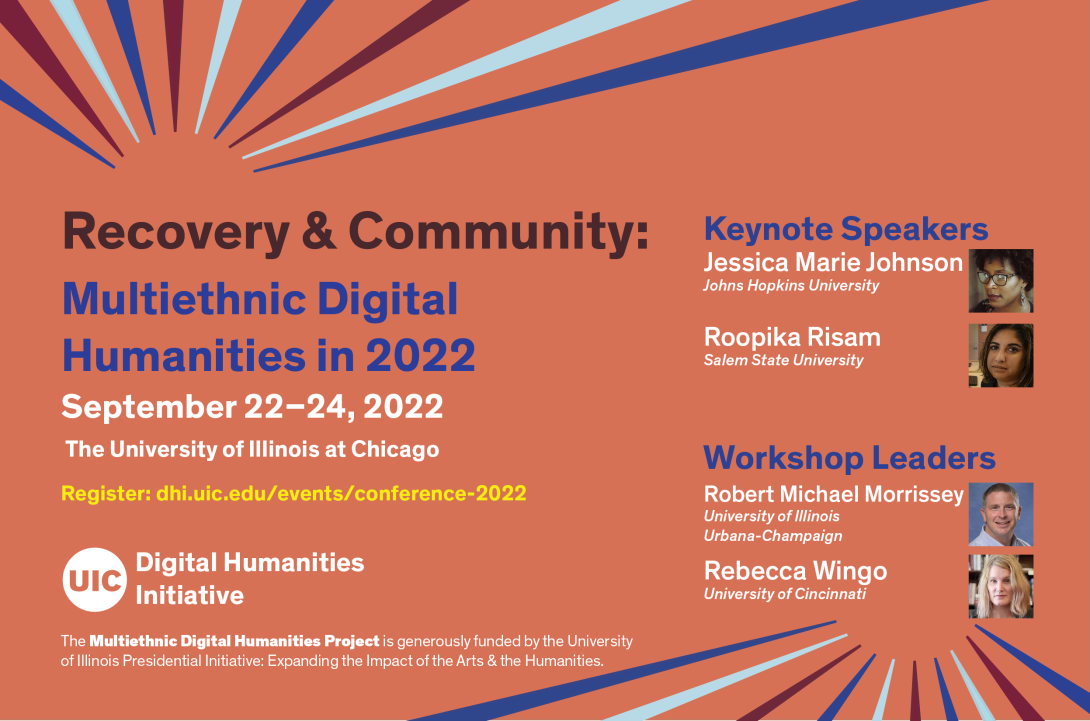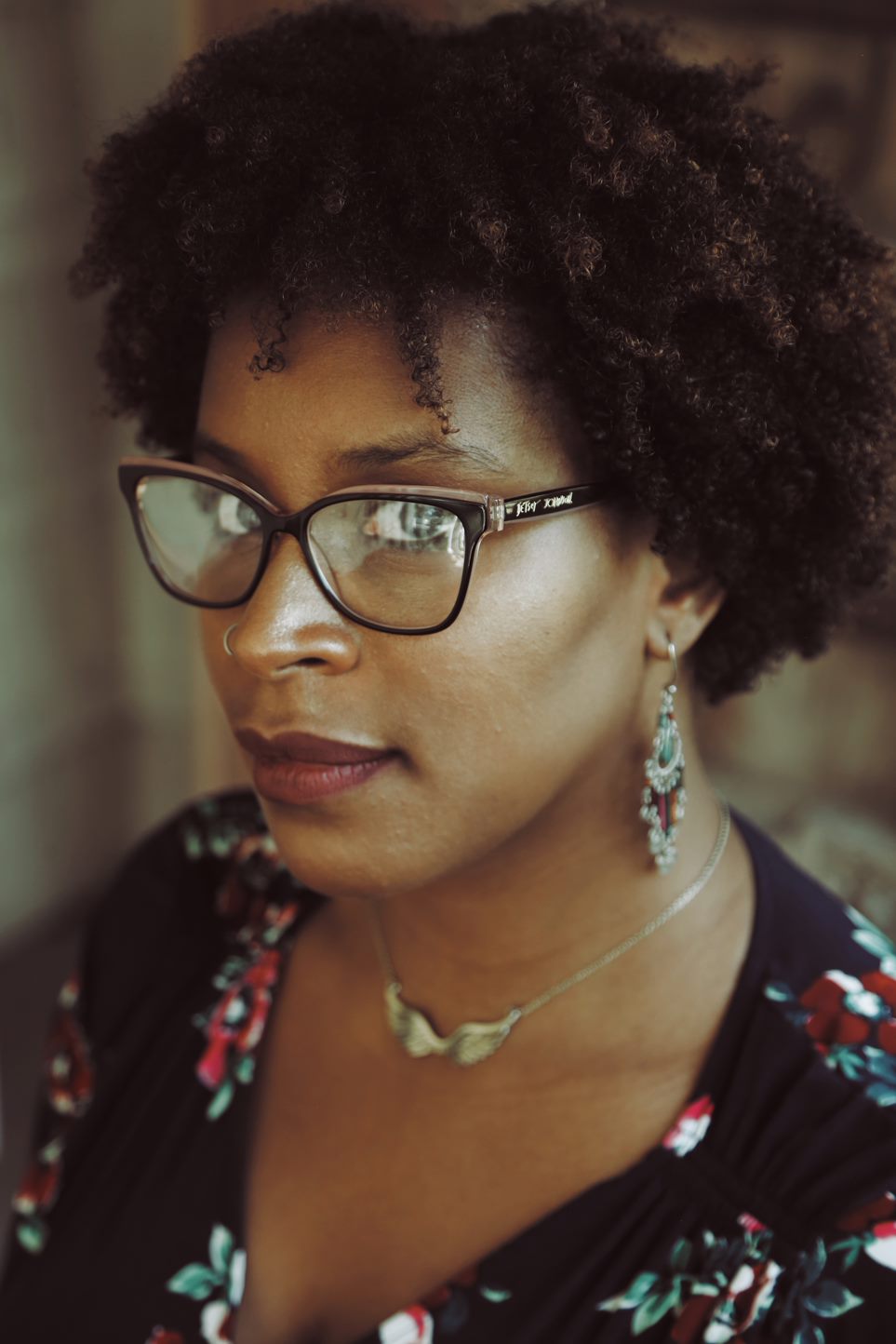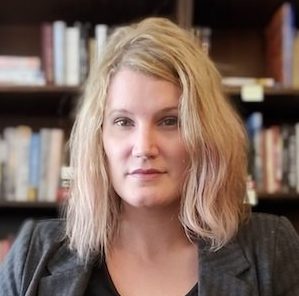Recovery and Community: Multiethnic Digital Humanities in 2022
September 22 - 24, 2022
Location
Student Center East (SCE), 713
Address
750 S Halsted St, Chicago, IL
Calendar
Download iCal File
Conference schedule is available below.
***
This conference explores the ways that digital platforms and methods both advance the scholarship on race and ethnicity and connect underrepresented communities, identities, histories, languages, and cultures with scholars, students, and interested publics.
Scholars from Asian, Black, Arab-American, Indigenous, Latinx studies, and other fields have revealed the potential of digital tools and platforms for multiethnic scholarship. These have also explored how community-based digital scholarship facilitates exciting collaborations featuring new stories and new storytellers. Inspired by their work, the conference will highlight how digital humanities scholars have enhanced the analysis of diverse communities; we will also highlight critical engagement with digital methods.
The in-person portion of the conference will be organized into interactive workshops to advance digital skills and panels that explore multiethnic digital humanities in scholarship, in the classroom, and in the community. The online portion will consist of recorded panels and videos featuring the future of multiethnic digital humanities. In addition to the in-person conference, we are showcasing select graduate student work related to our topic. You can find that work here.
This event is sponsored by the University of Illinois Presidential Initiative and the UIC Institute for Humanities and University Library.
We expect all participants and audience members to be vaccinated and to wear masks.
Date posted
Apr 22, 2022
Date updated
Oct 4, 2022
Speakers
Jessica Marie Johnson | Johns Hopkins University
Roopika Risam | Dartmouth College
Bob Morrissey | University of Illinois at Urbana-Champaign
Rebecca Wingo | University of Cincinnati
Recovery & Community: Conference Schedule Heading link
-
2:45PM – 3:00 PM: Welcome to UIC
Student Center East, 713
Alexis Guilbault
Director of the Digital Humanities Initiative and Postdoctoral Fellow, UIC
3:00PM – 4:30PM: Critical Digital Humanities
Moderated by Teresa Moreno (UIC Library)
Kellee E. Warren
Assistant Professor and Special Collections Librarian, UIC Library
“Toward an Afro-Asian Hip-Hop Dance Pedagogy: Embodied Knowledge and a Student Oral History Archive”
Lori Kido Lopez
Professor of Communication Arts and Director of Asian American Studies, University of Wisconsin-Madison
“Digitizing Asian American Studies”
Yena Lee
Doctoral student in the Media, Technology, and Society program at Northwestern School of Communication
“Towards a relational analysis of counterpublics: Case study of feminist counterpublic on Twitter K-pop fandom”
Maria Cotera
Associate Professor, Mexican American and Latino Studies Department, University of Texas at Austin
“Chicana por mi Raza: Reimagining Digital Memory Praxis”
-
8:30AM – 9:00AM: Coffee
Student Center East, 713
9:00AM – 10:30AM: Building Multiethnic Digital Projects
Moderated by Jane Rhodes (UIC, Black Studies)
Jewon Woo
Associate Professor of English at Lorain County Community College
“Paradox of (Digitally) Archiving Historical Black Newspapers”
Bryan Winston
Postdoctoral Fellow, Wesleyan Univeristy
“Remapping the Midwest: Visualizing Mexican Community Formation”
Rahim Kurwa
Assistant Professor, Department of Criminology, Law, and Justice, University of Illinois at Chicago
“The Second Sun: Black Community Building at the Margins of Los Angeles”
October Kamara
Graduate student in History, UIC
Reckoning Work: Locating Slavery’s Legacies on Southern College Campuses through Collaborative Archiving
10:45AM – 12:15PM: "Materials, Methods, Communities: Digital Methods and Early American Indigenous Histories"
Bob Morrissey, Associate Professor, Department of History, University of Illinois at Urbana-Champaign
Introduced by Cindy Tekobbe, UIC
12:15PM – 1:30PM: Lunch
.
1:30PM - 3:00PM Community and Student Projects
Moderated by Karen Leick (UIC English)
Hannah Huber
Digital Technology Leader for Southern Studies
“Un-editing Ely: Piloting a Digital Variorum of Ely Green’s Autobiography with First-Year Students”
Zeina Zaatari & Nadiah Alyafai
Director Arab American Cultural Center and Adjunct Faculty in Anthropology & UIC Undergraduate
“Qisassna: Making Our Stories Visible By and For Our Student Community”
Gayatri Reddy, Anna Guevarra, Abdallah Altamimi, & Michael Oliveros
Reddy is an Associate Professor in Anthropology and Gender and Women’s Studies, UIC
Guevarra is an Associate Professor and Founding Director of Global Asian Studies, UIC.
Altamimi is a History Major and Global Asian Studies Minor at UIC.
Oliveros is a Global Asian Studies and Gender & Women’s Studies Majors at UIC.
“Uptown Beats: The Making of a Community Mural”
Rachel Buff & Pilar Cary Sharp
Professor of History, Univeristy of Wisconsin-Milwaukee (UWM) & UWM Student in Public Health
“Wisconsin Community Activism Now: Archiving the Movements”
3:00PM – 3:30PM: Coffee Break
Student Center East, 713
3:30PM – 5:00 PM: Keynote: "Brittle Bits and Pieces: Adrift in Black Digital Practice"
Jessica Marie Johnson, Associate Professor of History, Johns Hopkins University
Introduced by Teri McMurtry-Chubb (UIC Law)
-
8:30AM – 9:00AM: Coffee
Student Center East, 713
9:00AM – 10:20AM: "Imagining a Digital Ethnic Future: Lessons from DEFCon"
Roopika Risam, Associate Professor of Film and Media Studies and of Comparative Literature at Dartmouth College
Introduced by Sandra De Groote
10:30AM – 11:00AM: Coffee Break
Student Center East, 713
11:00AM – 12:30PM: Hands-on History Harvest
Rebecca Wingo, Assistant Professor of History & Director of Public History at the University of Cincinnati
Introduced by Cristal Ramírez (UIC Student)
Registration Heading link
Accessibility and Inclusion Statement Heading link
-
Accessibility and Inclusion Statement
UIC is committed to full inclusion and participation of people with disabilities in all aspects of university life. The Digital Humanities Initiative’s in-person events typically involve a combination of presentation and discussion-based activities. We welcome ASL interpreters, note-takers, and accompanying assistants. If you have questions about access, such as parking or building layouts, or wish to request accommodations for our programming, such as ASL services, or obtaining event materials in alternative formats, please list your requests in the final box of the registration form above, or contact uicdhi@gmail.com.
We expect all participants and audience members to be vaccinated and to wear masks.



